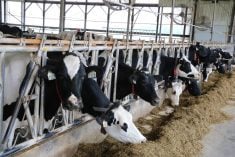Farm and municipal groups didn’t get a lot of news from the Manitoba government’s throne speech Nov. 19, although they did note some positive points.
Why it matters: Crime and health care took up good chunks of the provincial throne speech and agriculture got a few crumbs.
The speech contained “nothing groundbreaking,” according to Colin Hornby, manager of communications and stakeholder relations with Keystone Agricultural Producers, although he did welcome the idea, promised in the last provincial budget, that some Manitoba Agricultural Services Corporation offices would reopen.
Read Also

Finally getting paid for sustainable farming?
Alberta project says they might have a line on a workable ecosystem credit model to reward farmers for sustainability, and Manitoba might be next
Most items of interest from the speech, presented by Lieutenant Governor Anita Neville in Winnipeg, were general rural issues.
Health care figured highly. The province promised 870 new health care workers and a “record number” of doctors to be hired.
“We will bring more internationally educated health-care workers to the bedside by expediting the nursing re-entry program, creating more opportunities in rural and northern communities and opening new pathways for international medical graduates,” Neville read.
The nursing re-entry program helps previously registered nurses return to work.
Crime prevention was another key topic, although announcements about crime outside of city limits were largely general. No measures were focused specifically on rural crime, an issue pushed by farm and local government groups.
The speech said the province’s “new public safety strategy provides the direction and leadership that is missing to make our communities safer with tougher responses to crime and more proactive steps to prevent it.
“We’ve added more police presence to our streets, hiring more mental health workers so police can focus on violent crime and people in crisis get the help they need,” the speech read.
One of agriculture’s few mentions was its role in the province’s “new vision” for downtown Winnipeg. The speech referenced the proposed GATE headquarters, a new hub for Cereals Canada that will replace its current downtown space.
“The new Global Agricultural Technology Exchange campus will bring visitors to Manitoba and Manitoba grains to the world at a time when we need to diversify and expand our markets,” Neville read.
Agriculture will have a seat on a planned Lake Winnipeg working group, to include producers, environmental experts, Indigenous nations and industry representatives “to ensure the sustainability of our lake.”
“You should trust the lakes your children swim in, the air they breathe and the parts they play in are safe,” the speech read. “We will take steps to modernize the Environment Act to make big polluters pay for breaking environmental laws and strive for the highest standards in water protection.”
Kathy Valentino, interim president of the Association of Manitoba Municipalities (AMM), was pleased that line items in the speech addressed two of the association’s four pillars: invest in people and public safety. The remaining priorities — fair and predictable rural funding and investment in core infrastructure — did not.
Valentino cited a provincial “deficit” in water, wastewater, road and highway infrastructure projects, which received no attention in the speech, nor did rural funding.
“There was no mention of operating dollars for municipalities. We’ve been advocating hard to get our message to the province that we need a predictable funding model with a built-in escalator so that we can properly budget and prepare,” she said. “We’re so far behind with the rising costs and inflation that municipalities are struggling.”
Distribution of the announced medical resources has yet to be determined. However, Valentino is happy with some efforts made to date, such as reopening the Carberry Health Centre emergency department last spring.
She also approved of the provincial government’s public safety strategy, which identified a two per cent increase in municipal law enforcement.
“The lack of RCMP in rural Manitoba and remote areas is definitely a concern, so we need to work with the province, and the province addressed that in their public safety summit,” she said.
Overall, Valentino said she is pleased with the government’s willingness to listen to rural concerns.
“We work very well with this government and we look forward to continually being at the table with them with the concerns for municipalities and to work through all of the throne speech.”
The shortage of rural livestock veterinarians, a major file for both KAP and the AMM, was not mentioned, although Hornby noted there’s work going on behind the scenes. The farm group discussed a veterinary services strategy with the provincial government earlier this year.
“We’re in constant conversation with them to address the veterinary services, challenges, shortages that are a global problem but definitely something in Manitoba we’re trying to prioritize,” said Hornby.
In a follow-up interview, Manitoba Agriculture Minister Ron Kostyshyn saved special mention for the “freezing” of Crown land rents for the second year in a row (announced earlier this fall) as well as a hold on hydroelectricity rates for the coming year.
“The list is always long and I think we hit some very key points on health care, education and our priorities throughout the province of Manitoba,” he said.
“And actually, when you start to funnel it down, there was some great stuff on the agriculture side and I speak highly of the opportunity on the freezing of the Crown land rates. I think that is going to make quite a difference for our beef sector.
“But also freezing the hydro rates … In 2025, that’s making life a little bit more affordable in the province of Manitoba.”
















